|
|
|
Sort Order |
|
|
|
Items / Page
|
|
|
|
|
|
|
| Srl | Item |
| 1 |
ID:
131143
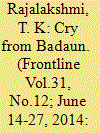

|
|
|
|
|
| Publication |
2014.
|
| Summary/Abstract |
The gang rape and murder of two minor girls in Uttar Pradesh brings to the fore factors such as cast dynamics and police apathy behind the growing crimes against women.
|
|
|
|
|
|
|
|
|
|
|
|
|
|
|
|
| 2 |
ID:
132419
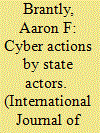

|
|
|
|
|
| Publication |
2014.
|
| Summary/Abstract |
Covert action is as old as political man. The subversive manipulation of others is nothing new. It has been written about since Sun Tzu and Kautilya. People and nations have always sought the use of shadowy means to influence situations and events. Covert action is and has been a staple of the state system. A dark and nefarious tool often banished to philosophical and intellectual exile, covert action is in truth an oft-used method of achieving utility that is frequently overlooked by academics. Modern scholars contend that, for utility to be achieved, activities such as war and diplomacy must be conducted transparently. Examined here is the construction of utility for a subset of covert action: cyber attacks.
|
|
|
|
|
|
|
|
|
|
|
|
|
|
|
|
| 3 |
ID:
096483


|
|
|
|
|
| Publication |
2010.
|
| Summary/Abstract |
While much has been written about identity formation and the politics of ethnicity among minority communities in various parts of modern-day Southeast Asia, the same cannot be said regarding the Malay community of Singapore. This article seeks to address this scholarly neglect by bringing into sharp focus the dynamics, processes, and circumstances that shaped Malay identity in postcolonial Singapore during the 1980s. By interweaving historical data with theoretical insights derived from the works of Andrew Willford, Manuel Castells, and Richard Jenkins, among others, this article provides an analytical reading of the global, regional, and local developments that brought about an ethnic resurgence within one of the largest minority groups in this island city-state. Such developments prompted the Singapore government to devise new laws and employ multi-faceted strategies to regain its legitimacy in the eyes of a certain segment of the population, and to enhance its ruling capacity. The problematics embedded within the state's interpretation of Malay identity and the effects of citizen resistance against state policies are considered in detail in the final sections of this article.
|
|
|
|
|
|
|
|
|
|
|
|
|
|
|
|
| 4 |
ID:
129452
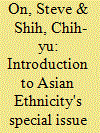

|
|
|
|
|
| Publication |
2014.
|
| Summary/Abstract |
Twenty-five years and counting, since Will Kymlicka's first book-length intervention in 1989,1 statements championing the politics of recognition and/or difference have emerged along with statements challenging the liberal accommodation of minority cultures.2 Falling under the broad description of multiculturalism, this genre of literature has gained traction in the mainstream and beyond. Today at least three specialized areas of research have been developed sometimes in opposition to and sometimes overlapping with liberal multiculturalism: feminist criticisms of multiculturalism,3 multiculturalism as antiracism, 4 and multiculturalism in Asia.5 Taking cue from, but not delimiting to, the last and burgeoning strand of multiculturalism, this special issue seeks to draw particular attention to three interrelated phenomena of ethnicities, governance, and human rights in Asia. Although these three topics have often been discussed in political science and sociology journals, rarely have they been examined in one setting. Moreover, these three issues tend to be subsumed under the broad descriptions of post-colonialism, nationalism, state-building, and development; they are largely incorporated into monograms on justice, democracy, rights, the state, culture, and equality. That is, despite their importance, the three themes have not been brought together.
|
|
|
|
|
|
|
|
|
|
|
|
|
|
|
|
| 5 |
ID:
151869
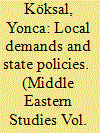

|
|
|
|
|
| Summary/Abstract |
By comparing the decisions of various meetings of the General Councils of Edirne and Ankara provinces from 1283 to 1288 (1867–1872 AD), this study analyses social and economic dynamics of both provinces, the state vocabulary for handling local demands, and the boundaries of responsibility for the state and the local actors in provincial administration. Instead of reading the Tanzimat as a top-down imposition, this article defines General Councils as sites of negotiations between state and local actors and instruments for local development. This article challenges the conventional view of provincial councils as weak and unable to implement various policies. It contributes to a new generation of studies that challenges the separation between state and social forces and looks at how both interacted in provincial administration.
|
|
|
|
|
|
|
|
|
|
|
|
|
|
|
|
| 6 |
ID:
127596
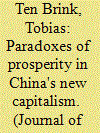

|
|
|
|
|
| Publication |
2013.
|
| Summary/Abstract |
This article gives a broad characterization of China`s political economy, as well as specific aspect of its socio-economic instabilities. With a focus on China`s export-oriented industry sectors, concept from comparative and international political economy are applied to show how the Chinese economy can be understood as a variegated from the state permeated capitalism that at the same time is deeply integrated into world economic processes. The article goes on to portray the socio-economic dynamics, as well as the instabilities of China's new capitalism, that are at the root of the state leadership's attempts to turn away from a one-side model of export and investment-driven growth. Thereby, a number of obstacles are revealed for the "rebalancing" of the economy: a continued dependence on exports, a lack of domestic consumer demand which impedes a significant "social upgrading, the ongoing low-wage model for which there is no end in sight, there limits of the state's steering capacity and the weaknesses of its fragmented, competition driven structure.
|
|
|
|
|
|
|
|
|
|
|
|
|
|
|
|
| 7 |
ID:
127603
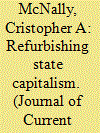

|
|
|
|
|
| Publication |
2013.
|
| Summary/Abstract |
This article provides an analysis of policy initiatives aimed at rebalancing China's political economy, especially those contained in the 12th Five Year Plan and other recent pronouncements. The objective is to generate a conceptual examination of these policy measures, thereby highlighting their basic intent and purpose. The analysis shows that the Chinese leadership intends to pursue policies that can centralize, standardize and regulate the political economy under continued state guidance. Due to the considerable political obstacles that Chinese policy-makers face in rebalancing the political economy, a more state-centric approach is seen as necessary. China is therefore pursuing a policy package of refurbishing state capitalism. While a degree of liberalization is likely to be undertaken, the major thrust is one of revamping, restructuring and, ultimately, strengthening state control and guidance over the political economy.
|
|
|
|
|
|
|
|
|
|
|
|
|
|
|
|
| 8 |
ID:
131513
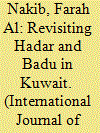

|
|
|
|
|
| Publication |
2014.
|
| Summary/Abstract |
Kuwait today is 99 percent urbanized. Though hosting a substantial desert population in the past, Kuwait no longer contains any Bedouin who practice a nomadic or pastoral lifestyle. And yet the term bad? remains in popular use in Kuwait to designate a group considered sociologically and culturally distinct from the ?a?ar, or settled urbanites, which in Kuwait's context refers solely to descendants of the pre-oil townspeople. This article explores why these social designations still exist in Kuwait and analyzes the origins of the conflictual relationship between the two groups. I argue that the persistence of the ?a?ar/bad? dichotomy is an outcome of state-building strategies adopted in the early oil years, mainly linked to citizenship and housing policies, that contributed to fixing ?a?ar and bad? as not only socially distinct but also geographically bounded groups. These state policies implemented between the 1950s and 1980s fostered the political integration but social exclusion of the bad?. The article examines the lived realities of these incoherent policies as one way of explaining how the bad? shifted from being the rulers' main loyalty base in the early oil decades to becoming their primary opposition today.
|
|
|
|
|
|
|
|
|
|
|
|
|
|
|
|
|
|
|
|
|